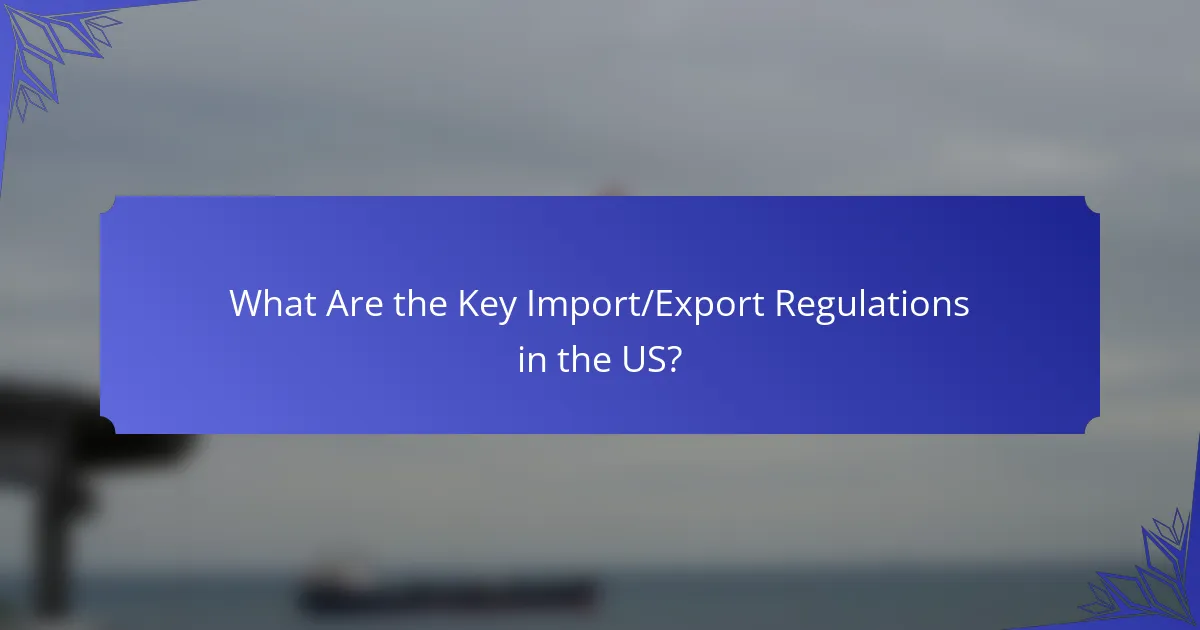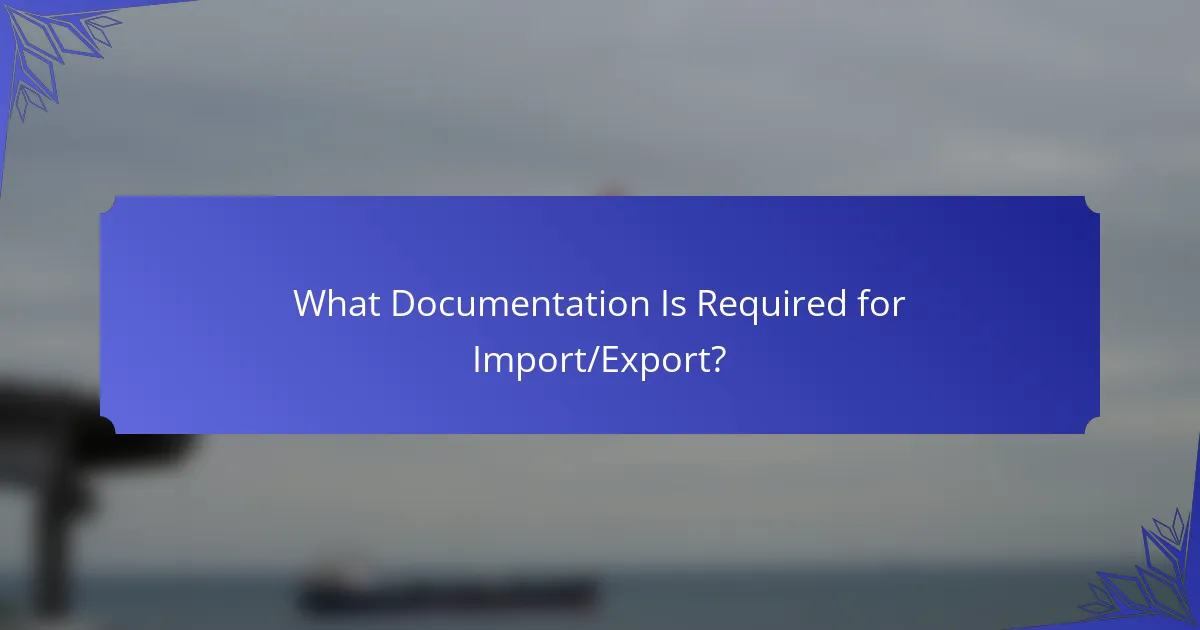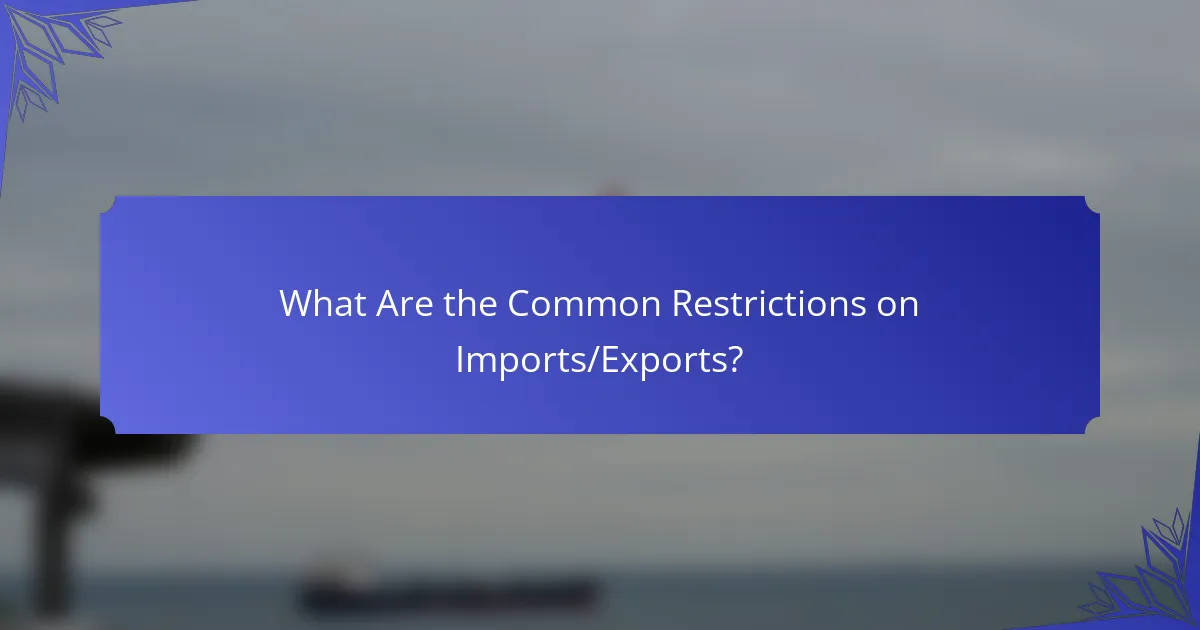Import/export regulations in the US are essential for governing the movement of goods across borders, ensuring compliance with national security and trade policies. To facilitate smooth international trade, businesses must understand the legal requirements and maintain proper documentation, which is vital for customs clearance and avoiding penalties.

What Are the Key Import/Export Regulations in the US?
The key import/export regulations in the US encompass a range of laws and guidelines that govern the movement of goods across borders. These regulations ensure compliance with national security, trade policies, and economic interests while facilitating international trade.
Customs regulations
Customs regulations in the US are enforced by the U.S. Customs and Border Protection (CBP). Importers must provide accurate documentation, including invoices and shipping manifests, to ensure compliance with federal laws. Failure to adhere to these regulations can result in fines, delays, or confiscation of goods.
It is crucial for businesses to understand the Harmonized Tariff Schedule (HTS) as it classifies goods and determines applicable duties. Regular updates to customs regulations require importers to stay informed to avoid penalties.
Trade agreements
The US has numerous trade agreements that impact import/export regulations, such as the United States-Mexico-Canada Agreement (USMCA) and various bilateral agreements. These agreements often reduce tariffs and simplify trade processes between member countries.
Businesses should leverage these agreements to enhance competitiveness. Understanding the specific terms and conditions of each agreement is essential for compliance and maximizing benefits.
Tariffs and duties
Tariffs are taxes imposed on imported goods, while duties refer to the specific fees charged based on the type and value of the goods. The rates can vary widely depending on the product category and the country of origin.
Importers should calculate potential tariffs when pricing products for the US market. Utilizing resources like the HTS can help determine the correct tariff classification and associated costs to avoid unexpected expenses.
Export controls
Export controls in the US are regulations that restrict the export of certain goods, technologies, and services for reasons related to national security and foreign policy. The Bureau of Industry and Security (BIS) oversees these controls, which may require licenses for specific exports.
Companies must assess whether their products fall under export control regulations before shipping. Non-compliance can lead to severe penalties, including fines and restrictions on future exports.
Import quotas
Import quotas are limits set by the government on the quantity of specific goods that can be imported during a given timeframe. These quotas aim to protect domestic industries from foreign competition and can significantly impact pricing and availability.
Importers should monitor quota limits and deadlines to ensure compliance. Failure to adhere to quotas can result in additional duties or the inability to import certain goods altogether, affecting supply chains and business operations.

How to Ensure Compliance with Import/Export Regulations?
Ensuring compliance with import/export regulations involves understanding the legal requirements and maintaining proper documentation. Companies must regularly assess their practices to avoid penalties and ensure smooth international trade operations.
Regular audits
Conducting regular audits is crucial for maintaining compliance with import/export regulations. These audits should evaluate documentation, processes, and adherence to legal requirements, helping to identify any discrepancies or areas for improvement.
Consider scheduling audits at least annually, or more frequently if your business experiences significant changes in operations or regulations. This proactive approach can prevent costly fines and disruptions in trade.
Training programs
Implementing training programs for employees involved in import/export activities is essential for compliance. These programs should cover relevant regulations, documentation requirements, and best practices to ensure everyone understands their responsibilities.
Training sessions can be conducted quarterly or biannually, incorporating updates on any regulatory changes. Engaging employees through workshops or e-learning can enhance their knowledge and reduce the risk of errors in compliance.
Compliance checklists
Utilizing compliance checklists can streamline the process of ensuring adherence to import/export regulations. These checklists should include key documentation requirements, regulatory obligations, and procedural steps necessary for compliance.
Creating a checklist tailored to your specific industry and trade routes can help staff systematically verify that all necessary actions are completed before shipments. Regularly updating the checklist to reflect changes in regulations is also vital for ongoing compliance.

What Documentation Is Required for Import/Export?
Importing and exporting goods requires several key documents to ensure compliance with regulations and smooth transactions. These documents provide essential information about the shipment and are crucial for customs clearance.
Commercial invoice
A commercial invoice is a vital document that outlines the sale transaction between the buyer and seller. It typically includes details such as the description of goods, quantity, price, and payment terms.
Ensure that the commercial invoice is accurate and matches the goods being shipped, as discrepancies can lead to delays or additional duties. It is often required by customs authorities to assess duties and taxes.
Bill of lading
The bill of lading serves as a receipt for the goods and a contract between the shipper and carrier. It details the type, quantity, and destination of the goods being transported.
There are different types of bills of lading, including straight and negotiable. A negotiable bill allows the transfer of ownership, which can be advantageous in trade transactions.
Certificate of origin
A certificate of origin certifies the country where the goods were manufactured. This document is often required by customs to determine the applicable tariffs and trade agreements.
Different countries have specific requirements for this certificate, and it may need to be notarized or issued by a chamber of commerce. Ensure you check the requirements for both the exporting and importing countries.
Import/export licenses
Import/export licenses are official approvals required for certain goods, particularly those that are regulated or restricted. These licenses ensure that the goods comply with national laws and international agreements.
Licenses may vary based on the type of product and the countries involved. It is crucial to verify whether your goods require a license and to apply for it well in advance of shipping to avoid delays.

What Are the Common Restrictions on Imports/Exports?
Common restrictions on imports and exports include prohibitions on certain items, limitations based on specific countries, and regulations concerning the end-use of goods. Understanding these restrictions is crucial for compliance and avoiding penalties during international trade.
Prohibited items
Prohibited items are goods that cannot be imported or exported under any circumstances. These often include illegal drugs, counterfeit products, and items that violate national security or public health regulations. For example, many countries ban the import of certain agricultural products to protect local ecosystems.
To ensure compliance, businesses should regularly consult their government’s trade regulations to identify any updates on prohibited items. Failure to adhere to these prohibitions can result in severe fines or confiscation of goods.
Restricted countries
Restricted countries are nations with which trade is limited or banned due to political, economic, or security reasons. For instance, the United States imposes restrictions on trade with countries like North Korea and Iran, which may include embargoes or specific licensing requirements.
When trading with restricted countries, it is essential to verify the current restrictions and obtain any necessary licenses. Engaging in trade with these nations without proper authorization can lead to substantial legal repercussions.
End-use restrictions
End-use restrictions apply to certain goods based on how they will be used once imported or exported. For example, military equipment may only be sold to specific entities or for designated purposes. These regulations help prevent the misuse of sensitive technologies.
Businesses should conduct thorough due diligence to ensure that their products are not being diverted to unauthorized end-users. This may involve requiring end-user certificates or conducting background checks on buyers to mitigate risks associated with end-use violations.

What Are the Consequences of Non-Compliance?
Non-compliance with import/export regulations can lead to severe penalties, including fines, shipment delays, and even legal action. Businesses may face reputational damage and loss of market access, impacting their overall operations and profitability.
Financial Penalties
Financial penalties for non-compliance can vary widely based on the severity of the violation and the specific regulations involved. Fines can range from hundreds to millions of dollars, depending on the nature of the infraction. For example, failing to provide accurate documentation may result in fines that are a percentage of the shipment’s value.
Legal Consequences
Legal consequences can include civil lawsuits or criminal charges against individuals or companies. Regulatory agencies may initiate investigations that could lead to sanctions or restrictions on future trading activities. In extreme cases, individuals responsible for compliance failures could face imprisonment.
Operational Disruptions
Non-compliance can cause significant operational disruptions, including delays in customs clearance and increased scrutiny from regulatory bodies. These disruptions can lead to higher shipping costs and potential loss of business relationships. Companies may need to divert resources to address compliance issues, affecting overall productivity.
Reputational Damage
Reputational damage is a critical consequence of non-compliance, as it can erode customer trust and investor confidence. Negative publicity can result from compliance failures, leading to a decline in sales and market share. Maintaining a strong compliance record is essential for sustaining long-term business relationships and brand integrity.

